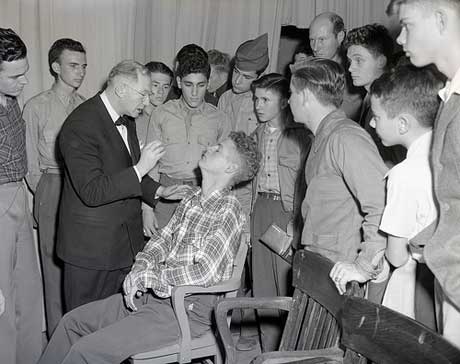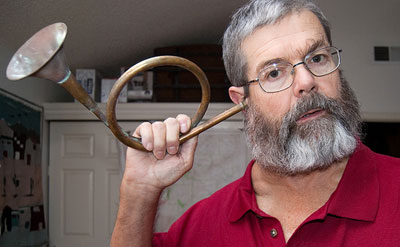
 Photo by Cushing Memorial Library and Archives, Texas A&M
Photo by Cushing Memorial Library and Archives, Texas A&MHypnosis is something that has always fascinated me. I’ve never personally been hypnotized to the best of my knowledge, but I’ve often wondered…how does the hypnosis process work?
Hypnosis in the Early Days
Hypnosis used to be something quite taboo and was often times performed as entertainment for the masses. These days it’s rarely done as a spectacle for crowds, mainly because it is now restricted by law to do so. So let’s take a look at how it is actually used in this day and age.
Who Uses Hypnosis and Why
People who perform the process of hypnosis are referred to as hypnotists and most of them are either doctors or hypnotherapists.
Generally the purpose for placing a patient under hypnosis is to treat things such as anxiety, psychosomatic disorders like stress-induced asthma or rashes. It is also used as a treatment for addictions such as drugs, alcohol or smoking.
But in some cases hypnosis has also been used as a means to retrieve information or memories from deep within someone’s subconscious. For instance it has been used in alien abduction cases as well as crime fighting, like we discussed in the post Cow Mutilating Extraterrestrials.
How to Hypnotize Someone
We’ve all seen numerous accounts on television of where someone undergoes hypnosis. Normally a doctor or psychiatrist will ask their patient to count backwards from 10 to 1, or they may swing a medallion in front of them and have them stare at it while they chant at them, “You’re getting sleeeeepy, your eyes are feeling heavy”.
This is actually not far from the truth in how this process really works. But normally the patient is asked to count backwards from a bit larger number such as 300, counting back from 10 just isn’t long enough for a patient to become fully relaxed. The purpose of this process is so the patient’s mind is relaxed which will cause them to easily respond to suggestion.
After the patient has become relaxed and is in full concentration, instructions may be muttered in a soothing tone repeatedly. The ultimate goal is to get the patient to enter a sort of sleep like trance which will cause them to accept influence from the hypnotist.
At this point the patient’s temperature has now fallen a bit as well as a lower pulse and blood pressure. There may also be signs of REM, or Rapid Eye Movements. It’s at this point that the patient may volunteer aspects of their anxieties they’ve kept bottled up.
Hypnotized subjects will always come back to their natural waking state, even if the hypnotist forgets to wake them. If they go for very long, they may simply fall asleep like normal and wake up naturally.
Contrary to popular belief, it’s next to impossible to hypnotize someone against their will. In order for this process to work, there must be a strong relationship of trust between the patient and doctor. And unlike TV and sideshows, it is not possible to cause someone to do something against their will while they are under hypnosis. The simple act of them moving around or getting up would be enough to wake them. They must stay completely relaxed for it to work.
Statistics show that approximately 80 percent of folks out there are able to undergo hypnosis in order to receive hypnotherapy.
Hypnosis in the Modern Day
Here in America, hypnosis has become quite popular as an alternative anaesthetic for surgery. Since this is a natural process, it is much less dangerous than the more common anaesthetics and carries no harmful side effects.
Many times it has been used in dental treatments as well as a way to ease the suffering of burn victims.
Have you ever been hypnotized and performed hypnosis on someone else? Please share you experiences in the comments below, we’re excited to hear from you!



I haven’t gone through hypnosis yet. But I heard it’s really effective.
Hi Kathryn, I’ve not actually experiences hypnosis myself either. But you’re right in that many folks will swear by it.
It’s especially dominant in the psychiatric fields and is fast becoming more and more accepted.
Hi Robert, thank you for sharing this insightful post about the hypnosis process. I’m a hypnotherapist in Liverpool so I’m always reading up on what others have to say and the public perception of hypnotherapy and hypnosis. If you’d like to learn more about the hypnosis process Robert, I’ve got a blog on my website dedicated to hypnotherapy and hypnosis. Feel free to check it out!
Hi Robert
Interesting post, you’re totally right that hypnotherapy can be used as an alternative and usually safer route around anesthetics and drugs. Great to see hypnotherapy being used for the health and well being of people rather than as a magic trick like back in the day!
Keep up the posts 🙂